A challenge to the U.S. Securities and Exchange Commission’s powers to protect investors from fraud comes before the Supreme Court on Wednesday, Nov. 29, in another in a series of legal attacks against federal agencies that regulate financial markets.
The justices are due to hear arguments in an appeal by President Joe Biden’s administration of a lower court’s ruling restricting the SEC’s power to enforce securities laws through the agency’s longstanding in-house tribunal system. The case involves hedge fund manager George Jarkesy, who the SEC fined and barred from the industry after determining he had committed securities fraud.
Critics of the agency have argued that its in-house system gives it the unfair advantage of prosecuting cases before its own judges rather than before a jury in federal court.
The New Orleans-based 5th U.S. Circuit Court of Appeals in 2022 ruled in favor of a legal challenge brought by Jarkesy. The 5th Circuit decided that the SEC’s power to seek penalties through in-house enforcement proceedings violates the U.S. Constitution’s Seventh Amendment right to a jury trial and infringes on presidential and congressional powers.
The case could make it harder for the SEC to weed out bad actors in the securities industry, legal experts said. The stakes are even higher because a separate challenge to FINRA, the Financial Industry Regulatory Authority, is working its way through lower courts.
The SEC and FINRA challenges are supported by conservative and business groups, which have complained about the regulatory reach of the federal “administrative state” in areas such as energy, the environment, climate policy, workplace safety and financial regulation.
“The danger is that if you take away the ability of FINRA and the SEC to efficiently remove misconduct and miscreants, you’re going to have misconduct linger a lot longer,” University of Nevada, Las Vegas securities law professor Benjamin Edwards said.
“Our financial system ultimately runs on trust, and you have to be able to trust that the people you’re working with are operating honestly — and having a vigorous enforcement structure in place is pretty important,” Edwards added.
The SEC, which enforces various U.S. laws that protect investors, has faced a series of legal attacks even as the Supreme Court, with its 6-3 conservative majority, has signaled skepticism toward expansive federal regulatory power.
The court in 2018 faulted the way the SEC selected its in-house judges, and in April made it easier for targets of agency actions to mount challenges in federal court.
The justices also are set to decide in the coming months whether the Consumer Financial Protection Bureau’s funding structure conforms with the U.S. Constitution and could overturn a decades-old precedent that helps federal agencies defend regulatory actions in court.
Barred from the Industry
The SEC in 2011 began investigating Jarkesy, who founded two hedge funds with his Houston-based investment advisory firm, Patriot28 LLC. The funds had about 120 investors and roughly $24 million in assets under management.
The SEC charges against Jarkesy and his firm proceeded before an in-house judge. The agency upheld the judge’s findings that Jarkesy and his firm violated the Securities Act of 1933 and other laws including by misrepresenting the identity of the funds’ auditor and value of the holdings.
The agency ordered them to pay a $300,000 civil penalty and Patriot28 to disgorge nearly $685,000 in ill-gotten gains, while barring Jarkesy from the securities industry.
The 5th Circuit tossed the SEC’s decision against Jarkesy. In addition to its conclusion about the right to a jury trial, the 5th Circuit found that the SEC wielded too much power in choosing whether to bring cases in-house or in federal court, and that job protections for its administrative judges make them too difficult to remove, infringing on presidential powers under the Constitution.
The FINRA case — a constitutional challenge to its structure brought by Utah-based Alpine Securities Corp — is currently before another federal appellate court and eventually could come to the Supreme Court.
Under federal law, securities brokers and dealers generally must become FINRA members and are subject to its rules and disciplinary measures. FINRA calls itself a “private, not-for-profit corporation.”
Alpine, facing a disciplinary proceeding that would expel it from the industry, claimed that FINRA wields government power and therefore must be subject to the Constitution’s provisions, including presidential oversight of its officers. FINRA has said the suit poses an “existential threat” to the organization.
UCLA School of Law corporate law expert James Park said frustration has grown in the business community as the SEC has routinely imposed fines on various defendants.
“I think they think the SEC and, perhaps, FINRA to some extent have in a sense gotten too aggressive because … there are very few checks on their discretion in the current system,” Park said.
This article was provided by Reuters.







